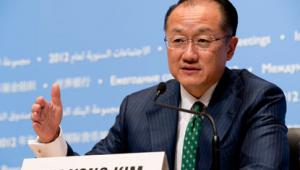By Judith Ugwumadu | 28 January 2015
World Bank president Jim Yong Kim has set out a proposal for an insurance-style pandemic facility to help countries tackle future disease outbreaks in the wake of the Ebola crisis.
Speaking in Washington, Kim warned that the world is ‘dangerously unprepared’ for future health pandemics, which had the potential to be more deadly than Ebola.
He warned that lessons must be learnt from the Ebola outbreak ‘because there is no doubt we will be faced with other pandemics in the years to come’.
The countries most affected by Ebola – Guinea, Liberia, and Sierra Leone – had seen a ‘devastating loss of lives and loss of economic growth,’ Kim said. A World Bank report last week stated that these countries could forgo $1.6bn of growth in 2015.
‘We need to make sure that we get to zero cases in this Ebola outbreak. At the same time, we need to prepare for future pandemics that could become far more deadly and infectious than what we have seen so far with Ebola.’
Kim revealed that the World Bank had been working with the World Health Organisation and other United Nations agencies as well as academics and re-insurance company officials on the idea of ‘developing a pandemic facility’.
He said he expected a proposal to be presented in the coming months to leaders of developed and developing countries.
The proposal would likely involve a combination of bonds and insurance instruments, but Kim said in some ways, a future pandemic response facility was similar to a homeowner’s insurance policy.
‘This could work like insurance policies that people understand, like fire insurance. The more that you are prepared for a fire, such as having several smoke detectors in your house, the lower the premium you pay,’ he said.
‘The more that countries, multi-lateral institutions, corporations and donors work together to prepare for future pandemics – by building stronger health systems, improved surveillance and chains of supply and transportation, and fast-acting medical response teams – the lower the premium as well.
‘That would benefit donors and others who would pay the premium, but the greatest benefit would be that market mechanisms would help us to push improvements in our preparedness for epidemics.’
One possible outcome from the development of a pandemic facility would be a strengthened World Health Organisation, as well as capacity in developing countries for stronger regional disease-control agencies.
Discussions on a proposed pandemic facility were also held in informal sessions at the World Economic Forum in Davos, Switzerland, last week, Kim said.











